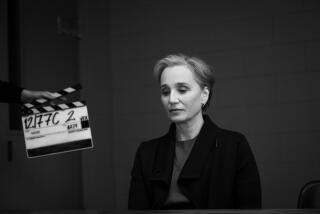Virginia Thomas: A Wife Shares Husband’s Ordeal : Family: Although from different backgrounds, they are alike in both temperament and politics, friends say. The two have become inseparable.
- Share via
WASHINGTON — She is by turns impassive, defiant, angry and tearful. As she sits behind her husband, Virginia Thomas’ face catalogues her emotions and betrays her ordeal.
“I saw her break down in tears last night,” her mother, Marjorie Lamp, said Saturday. “And I broke down too.”
Virginia Lamp Thomas is a lawyer from Omaha. She has been a congressional aide and a business lobbyist and now is a legislative official for the U.S. Department of Labor. But after this month she will be remembered as the wife who sat at Clarence Thomas’ elbow while he tried to fight off the ugliest kind of accusations before the eyes of the nation.
As a white woman from an upper-middle-class background, she knew she would have to cope with controversy when she married an outspoken, conservative African-American in 1987. But she could not have expected this.
On Saturday, she told friends at the hearing that she was feeling fine. Not everyone believed her.
“She’s a strong woman, a resilient woman,” said the Rev. Rodney Wilmoth, of Omaha’s St. Paul’s United Methodist Church, who officiated at the couple’s large wedding. “But I could see they were getting so close to the nerve endings, it was tearing up Ginny.”
The Thomases have become inseparable in their shared pain. When they returned to their home in suburban Virginia Friday afternoon after the judge had made his opening statement, Thomas refused to watch the televised testimony of Anita Faye Hill, who has accused him of sexual harassment. But Virginia Thomas described bits of Hill’s allegations to her husband, as he sat in another room.
Clarence Thomas is medium height and broad. Virginia Thomas is tall, with brown curls, blue eyes and the blushing pink complexion of a Thomas Gainsborough portrait. They are opposites in appearance and background but complementary in temperament and like-minded in politics, friends say.
Both have argued against “comparable-worth” laws that would give women and men equal pay, contending that no bureaucracy should be set up to interfere with the market in wages. Both believe that minorities are hurt, not helped, by affirmative action that gives advantage to the less qualified.
Now 34, Virginia Thomas is the youngest of the four children of Donald and Marjorie Lamp, who have long been active in Nebraska Republican politics. The Lamps believe strongly in the value of family and religion.
Virginia Lamp received a bachelor’s degree in business communications and political science from the Jesuit-run Creighton University in Omaha. She studied hard, got good grades and spent free time working for former Rep. Hal Daub, a Republican who was swept into office with Ronald Reagan in 1981.
When Daub went to Washington, she went too, quickly finding the city’s political obsession to her liking. Before long, Virginia Lamp had been promoted to Daub’s legislative director.
In 1982, she went back to Creighton for a law degree. She returned to Daub’s office but left in 1985 to join the U.S. Chamber of Commerce as a labor attorney, where she spent a good deal of time working on such issues as comparable-worth legislation.
She was a joiner and an idealist. She was somebody who liked to work within organizations that she believed in.
Perhaps because of that inclination, in the mid-1980s she became entangled in another cause, Lifespring, a controversial personal-growth organization that emerged in the 1970s. The program once had as many as 300,000 members and was founded by a man named John Hanley. He grew wealthy from his creation but was convicted of six felony counts of mail fraud in connection with a scheme to sell cleaning-service territories.
Lifespring has been accused of “programming” its members to contribute money and recruit more disciples. By 1985, though, Virginia Lamp had become disillusioned, broken away from the organization--and had become active in groups trying to raise consciousness to the dangers of cults.
“I had intellectually and emotionally gotten myself so wrapped up with this group that I was moving away from my family and friends and the people I work with,” she said in a 1987 interview with the Washington Post.
In 1985, she had crossed the path of Clarence Thomas, then chairman of the Equal Employment Opportunity Commission, because of their shared opposition to comparable-worth proposals. He had been married before, to Kathy Ambush, but had been divorced in 1984.
In three years, their friendship deepened and they decided to be married. Friends and family members initially were shocked to hear of the plan. And Thomas has since been criticized for it by some blacks, who maintain that his marriage to a white woman is a sign that he rejects his own race.
But, by all accounts, the marriage is solid. Living with the couple is 19-year-old Jamal Thomas, the judge’s son from his first marriage.
Virginia Thomas remains close to her parents. But she declined their offer to be with the couple during the hearings--she simply thought there was no reason to put them through the pain, friends say.
“So we’re here at home, doing what we can to lend support,” said Marjorie Lamp. That support includes urging every Nebraskan who calls to tell Sen. J. James Exon, the Nebraska Democrat, to vote for Thomas.
Friends fear that the Thomases’ nightmare may worsen but insist that they will endure. “I’ve always said Clarence Thomas is a lion,” said Ricky Silberman, who is vice chairman of the EEOC and a family friend. “She is a lioness.”
More to Read
Sign up for Essential California
The most important California stories and recommendations in your inbox every morning.
You may occasionally receive promotional content from the Los Angeles Times.














